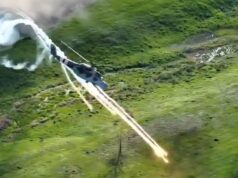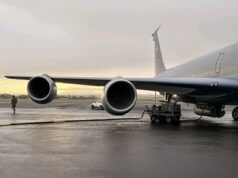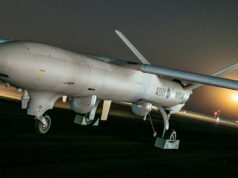Admiral Sir Tony Radakin, Chief of the Defence Staff, has called for a transformative overhaul of the UK’s defence sector to embrace the “British way of warfare,” while warning that slow and risk-averse processes are hindering progress.
Speaking at the Royal United Services Institute (RUSI), Radakin stressed the need for Defence to adapt to modern challenges through disruptive innovation and a more flexible approach to procurement and strategy.
Radakin criticised the current system as being burdened by “too much hierarchy and process, too much duplication, and not enough prioritisation,” acknowledging that progress since his 2021 reform agenda has been slow.
“We are still too slow. We are still too cautious. Too risk averse,†he said. “It is precisely because of the security outlook that exists today that the case for reform is even stronger than ever.â€
He argued that disruptive threats, such as the ability of Houthi insurgents to disrupt global maritime trade with limited resources, require equally disruptive responses.
Radakin highlighted the UK’s response to Ukraine as an example of effective innovation, made possible by a flexible system that prioritised speed and embraced risk. However, he noted that such agility has been limited to specific scenarios, with systemic inertia often stifling broader transformation.
To address this, Radakin proposed a dual-track system:
- “Fail Safe”: Traditional methods for delivering major projects and core capabilities, such as nuclear deterrence.
- “Safe to Fail”: A risk-tolerant approach for high-potential projects, allowing Defence to invest in multiple initiatives with the expectation that some may fail, but one breakthrough could deliver transformative capabilities.
“This feels much closer to the British way of warfare,†he said. “We have rarely been about mass. We have always sought to achieve a competitive advantage through a blend of human and technological overmatch – or in other words, our edge.â€
Radakin contrasted the UK’s approach with Russia’s ineffective mass-based strategy in Ukraine and praised Israel’s response to Iran as an example of the “disproportionate advantage of modern ways of fighting.”
He called for the UK to lean into its strengths, such as its world-class defence industry, thriving tech sector, and exceptional military personnel, to maintain its edge in a rapidly evolving global security environment.
“Every military needs an edge. That’s how you defeat an enemy,†he concluded.
At the UK Defence Journal, we aim to deliver accurate and timely news on defence matters. We rely on the support of readers like you to maintain our independence and high-quality journalism. Please consider making a one-off donation to help us continue our work. Click here to donate. Thank you for your support!













That’s good but HMT will not allow it or HMG 🙄🙄🙄
The way forward is to be more aggressive with military timelines. How many UK projects are running late with the magical ISD of 2030! That is a date of convenience, an excuse to bat or lick the ball of issues down the ‘decade tunnel’ in the hope nobody asks too many questions. For every late programme, the nation is at risk from people who only want to do us harm. There is so much money to be made from defence, that one wonders just what games can be played by those whose sole aim is to make mega profits. However, there could be a major storm on the horizon with proposed US Government cuts on a huge scale once Trump’s administration is ensconced in the White House and defence will be high on their priority list. The UK and Europe need to be prepared to fill the gap left behind by US forces and that could be before Trump’s review of his NATO commitments. We all need to be wise to Musk, who promises huge cuts to US Government spending and he’s one man that can not be ignored. For an example of how he operates, just look at Space X’s achievements it puts NASA in the shade.
I agree but I don’t see the US leaving any big gaps we need to fill for European defence. Two brigades and a handful of squadrons is not exactly doing much to keep Europe safe. The US only has 100,000 personnel in Europe and many of them are involved in projecting assets into the Middle East.
The main area the US will be missed in is expeditionary capability and long range strike as well as nuclear counter force. That’s what we should focus on. Europe has more than enough soldiers and artillery to deal with Russia and China is not likely to be a threat to Europe any time soon.
Jim, there will be a gap if commitment is either cut or denied due to US foreign policy. It’s not what forces are currently positioned that matters but the huge US forces back up once mobilised. We don’t know the scale of prepositioned war stocks stationed in Europe but YouTube videos give some estimation. There is little doubt that the US will defend Europe and maintain its commitment to NATO however, if the defence cutbacks are substantial those reinforcement numbers could be compromised. Trump will make these next four years extremely turbulent for the World, which might have far-reaching effects on money markets and even the sanctity of current monetary instruments. Today, Germany and France the cornerstones of the EU, are in considerable turmoil, which can only be sweet music to Putin’s ears and how Ukraine will navigate under Trump’s presidency is much discussed. None of Europe’s military is where it ought to be at this point and Ukraine has exposed that, yet there still appears to be only a sluggish response from this labour government, which is hiding behind the blasted ‘Defence Review.’ Talk about batting the issues down the road, this review is yet another anchor point for unappetising questions from the media. The recent cuts announced by the Minister demonstrate just how cynical Whitehall can be.
It’s not the 100k soldiers or the “handful of squadrons” that’s the main deterrent. It’s the huge military resources that the US can bring to bear, that EU lacks and will lack for the foreseeable future.
Let’s be very honest it’s also 1000+ nuclear warheads and a full nuclear triad. The UK having one SSBN with 40 warheads and France about the same leaves Europe with a pretty modest strategic nuclear deterrence. Russia has 92 cities with a population over 250,000 you probably want to hold a majority of those at risk so realistically Europe needs a joint strategic deterrence of more like 80 warheads per SSBN on patrol so 160 between the UK and France, that would essentially guarantee the destruction of the Russian state.
Is the Chief of Defence Staff trying to say that it’s not his fault or the other military leaders fault that the MOD is burried in bureaucracy, whose fault does he think it is? I can’t see any politicans or civil servants demanding we have so many generals and admirals nor can I see them coming up with the never ending four letter acronym programs.
Simple solution just half the number of military leaders 1 star and above and double the pay of those that are left.
Or use the ‘savings’ to fund more mass.
Not convinced by the “British way of war” idea.
From the Napoleonic wars, Britain maintained the largest navy in the world, equal to the 2 next largest combined. After WW1, the Washington treaties agreed equal top size for the RN and the USN.
In both 1914 and 1939, the BEF was too small to act as a credible deterrent to German aggression. It took 2 years to build and deploy a mass army in 1916, even longer after 1940.
As for airpower, the newly formed RAF was the largest air force in the world in 1918. By 1943, with over a million men, it was much larger than the Luftwaffe.
The lesson is that Britain does not maintain in peacetime the means to expand forces to the necessary mass in a crisis.
Radakin may be right about the slow pace of procurement and strategy development. But given the incredibly long design and build schedules of modern equipment, generating trained and equipped forces in sufficient mass will take even longer than in the past. He misses that most crucial point entirely.
“given the incredibly long design and build schedules of modern equipment“….
Given this, perhaps it makes sense to maintain production capacity for existing equipment until such times as new equipment capacity can replace it. I.e where possible never shut down and dismantle the means of production until its replacement is up and running. Yes the existing weapon may not be considered as ‘good’ as its replacement but if Ukraine has shown us anything even old and obsolete weapon designs can have a role in holding back an aggressor. We should never leave ourselves in a situation where ramping up production is delayed because we haven’t actual started building the facilities and we’ve shut the previous ones.
Totally agree. It’s beyond stupid to allow armoured vehicle manufacture to close down because of a short term lack of orders. And only now is UK regaining the ability to manufacture artillery gun barrels. Other things can be kept in storage for years- small arms and ammunition for example. Most other weapons and ammunition have a shelf life which must mean that to maintain the stock you need, replacement production has to be planned long term.
In one sense, that is exactly the opposite of what Radakin is arguing for. But if you can only get say 7/8 escorts to sea, how transformational can any novel bit of kit really be?
So you would have paid engineers to do nothing? I don’t think they would want that.
Exactly.
The “British way of warfare” is to blockade the enemy into submission, to close them off from the rest of the world.
We’ve done it in every war since the 1750s and we are currently losing that ability to maintain forces at any distance from our bases.
I’m not saying that we need a Channel Fleet off Murmansk, but the naval overmatch that has always given us the strategic advantage has been ceded to the USA and now lost entirely.
Frankly, who gives a damn about the army? Tell the European powers like Poland and Germany to hold back the Russian bear while we starve it.
P.s. I’m slightly playing devil’s advocate but the discussion is worth having.
Or, the British way of war is to is to land inadequate forces and then have to evacuate them using a superior navy. Then return, if you can, with the forces you should have used in the first place.
The trouble now is that with all our forces so diminished in size, the options for their use are severely limited. Nor is it easy to see what, assuming a flat budget, could be reduced to fund expansion elsewhere.
The forces are just too small.
The tradition is that the Generals convince the Politicians that good old Tommy will send the enemy home quickly, thereby preventing any possibility of a long war.
Because Britain is not a land power, Tommy loses at great cost and gets taxied home by the Navy/air force, who slowly destroy the enemy’s means to make war through blockade by air and by sea.
Once the enemy is already defeated, Tommy gets taxied back into the war by the Navy, wins against the diminished opponent and claims a glorious victory.
Tried and tested strategy, just we don’t need the first part.
Strange, i think British way of war today is to feed the enemy.
He is correct but this approach requires a national culture of innovation, which does not currently exist in the UK in any meaningful form. Britain has had many excellent technology companies, but they have often gone bust, been offshored or been sold off to foreign corporations and gutted. Anyone remember Acorn Computers? ARM? Reaction Engines Ltd?
Fixing this problem is possible but will require a radically different attitude to tech, the economy and risk taking. It requires the UK to nurture a business and social environment attractive to domestic tech startups. It requires the British people to actually take pride in their tech and defense industries, and not simply complain/protest about how evil they allegedly are.
The US is facing very similar problems right now but unlike the UK, it has a huge amount of *well funded* technology talent to experiment and build things.
It also needs to curtail the asset strippers from using British tech companies to make a fast buck. It’s not always about money.
Risk averse is the only way. Accountants rule the world. No goods, no money. No money, no goods. Saves loads of cash to throw at the NHS.
Radakin seems not to understand the manifold advantages of having significant mass, let alone having barely sufficient mass. He rubbishes the virtues of mass in a crude way by pointing to the poor performance of the Russian Army who had an abundance of mass. Could he be shaping us for further reduction in mass, both platform count and manpower levels, prior to SDR reporting?
Rumours have been circulating for a while of a future sub-70k regular army.
Hypocritical at minimum. He is Admiral since 2014 , so as much as a military man as a politician. The British armed forces of today, specially RN have a lot of to do with him. I am sure he was rewarded with promotions by not disagreeing about what have been happening.
Our means of warfare – Cut, gap, underarm – then expect our outstanding people to compensate.